|
Welcome to A&A. There are 18 full reviews in this issue. Click on an artist to jump to the review, or simply scroll through the list. If you want information on any particular release, check out the Label info page. All reviews are written by Jon Worley unless otherwise noted. If you have any problems, criticisms or suggestions, drop me a line.
|
|
|
A&A #256 reviews (August 2004)
������������������������������������� 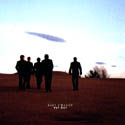 Baby Strange
Baby StrangePut Out (Primary Voltage) The press says these guys worship at the altar of the Who, the Zombies, etc. And let's not forget the band's, um, namesake, the tune from T.Rex's The Slider. So we've got some anglo-pop, some straight-up rock and roll and a certain modern sensibility that ties it all together. Indeed, these boys are anything but retro copycats. Sure, that opening lick for "Broken Heart Mechanic" is tres Bolan, but the song incorporates some Stones-y attitude and a little bit of Big Star tunesmithing. These boys do have a bit of a penchant for the blue-eyed soul as well. A nice mix of styles that mix well together. The sound has that clean-yet-thick feel that made those classic T.Rex albums so great. Not overdone, but enough power to get the adrenaline pumping. Quite nice. Just one of those albums that sounds great from the first riff. Baby Strange has a knack for writing fine songs, and they made sure to get the right sound as well. That sort of attention to detail is always good to see, and it bodes well for the band as it further harnesses its power.
Contact:
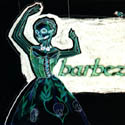 Barbez BarbezBarbez (Important) Important releases stuff from the likes of Jad Fair, Merzbow, Daniel Johnston, etc. Indeed, the King Missile III album reviewed below is also an Important release. So right off, I got the idea that this wasn't going to be just any ol' album. I guess not. The dominant instruments are violin and marimba, with a healthy dose of accordion. The Kurt Weill-meets-Residents-meets-Russian wedding band reference from the web site isn't that far off. The accordion and marimba do lend an "old Europe" feel to the pieces here, which are themselves steeped in the European art song tradition. Well, until they kinda devolve into punky noise and general chaos. See, Barbez is almost as interested in deconstruction as it is in standard musical forms, and that dichotomy makes for some most interesting conflicts. These songs often sound like a musical representation of a Stalingrad reenactment--staged within the mind of a paranoid schizophrenic. Mind you, I think that's utterly awesome. Barbez is perfectly willing to play nice. For a time. And then the knives come out. Those moments are the ones that really grab me. Mordant and glistening with greatness.
Contact:
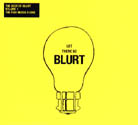 Blurt BlurtThe Best of Blurt--Volume One--The Fish Needs a Bike (Salamander Rcords) Ted Milton plays sax. Blurt was (and is) his outfit, a nice little trio (guitar and drums). The tracks here were recorded from 1980-1986 (Vol. 2 will be released at some future date). Those are the facts. But there's a lot more to tell. First, Milton isn't a jazz saxophonist. I'm sure he's played a little jazz here and there (and maybe even a lot), but the noises he makes here are good old rock and roll. The stripped-down rhythm section is as bare as it can be, but that just gives these songs that much more kinetic impulse. Not unlike Flat Duo Jets--the groundbreaking guitar and drum garagabilly duo--Blurt's charms are amplified by the decidedly low-tech approach to writing and recording. I didn't hear any overdubs; it sounds like these songs were recorded live to tape. They certainly have that loose, akimbo feel to them. It's hard not to get swept up in the fun. I gave in almost immediately. Blurt's charms aren't refined, but that only makes them that much more irresistible. One of those albums that is simply too much fun to avoid.
Contact:
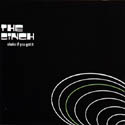 The
Cinch The
CinchShake It If You Got It (Dirtnap) Somewhere between Iggy and the Stooges and Poster Children--but much better-produced and fronted by two female singers--lies the Cinch. These songs have a fine raw power that is refined into a tuneful current. That's the feel I get, ragged punk pop represented by a rolling river. The melodies float nicely above the tight, insistent rhythm section. The sorta stuff that gets hypnotic in a hurry. I suppose I could reference a band like Pluto and that whole "strummed punk" movement of ten years back (or so), but I like my initial reaction better. The sound is much, much more refined than most Dirtnap releases. In itself, that doesn't mean much, but these songs sound better with rounded tones than they would with a sharper, more jagged approach. Just about everything here is spot on. I quite liked the first Cinch EP, but this is much better. The band is beginning to really get a handle on its sound. The folks have moved from solid to very, very good. I can't wait to hear what's next.
Contact:
������������������������������������� 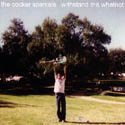 The Cocker Spaniels The Cocker SpanielsWithstand the Whatnot (Artbreak) Sean Padilla just graduated from Baylor. He's been making recordings as the Cocker Spaniels for something like 10 years now. In the beginning, it was a band. For quite a while now, it's been just him. And that makes this a most interesting CD. The songs take on everything from race relations (apparently some of his earlier albums were more focused on racism, but his observations here are more wry and revealing than angry and bitter) to the vagaries of boy-girl relations. I don't think it would be entirely fair to call him the black Jad Fair, but then again, the first song on this album is titled, "The Only Black Guy at the Indie Rock Show." You make the call. Certainly, the music does share a certain idiosyncratic feel with Fair, and Padilla himself claims to take great inspiration from Guided By Voices. That and other similar influences come through loud and clear. But what drives this album is Padilla's skill as an observational poet. I'm not usually taken by the lyrical content of an album, but there's no other way to review this album. The music is simply a medium for conducting Padilla's thoughts. It serves its purpose, and the album shines as a result. Weird--very weird at times--but well worth investigating.
Contact:
������������������������������������� 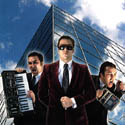 Corporate MF
Corporate MFThe Royal We (Omega Point) Wonderfully smarmy synth-rock. Corporate MF sounds like a Smashmouth cover band playing the Ramada--except that in my imagined universe, Smashmouth wrote really good songs. A lot of that has to do with the decided absence of guitars. The basic sound is bass (yes, I know bass is a type of guitar...), drums, organ and synthesizer, with a few choice bits of noisy weirdness thrown in. The pieces themselves are basic 60s style groove rock, updated and shredded for the rigors of modern life. The sound is astonishingly dirty for such a technologically-driven band. It's a great idea; there's no good reason why these songs should be all shiny and pretty. That extra bit of aggression in the sound pays off, making the songs that much more engaging. One of those albums I kept meaning to put down but couldn't. I'm not entirely sure why I like it so much, but there's something about the sound and the songs that keeps the headphones glued to my head. Maybe it's one of those subliminable messages the Prez keeps whining about. No complaints from me.
Contact:
������������������������������������� 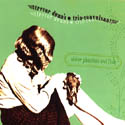 Trevor Dunn's Trio-Convulsant
Trevor Dunn's Trio-ConvulsantSister Phantom Owl Fish (Ipecac) As the sticker on the jewel box says, "Yes, the Trevor Dunn from Fantomas and Mr. Bungle." Yes, it is him, and yes, trust that he'll find every excuse to wig out when he doesn't have to kowtow to anyone else's ideas. The songs are an unholy mess of styles and sounds. But Dunn does have a decent handle on jazz construction, and most of the time he manages to keep these songs together. In fact, the closer to jazz (as opposed to prog or hard rock or noise) the sound is, the more these songs sound coherent. No matter what style Dunn happens to be channeling with his guitar, he's always going at least three places at once. He's got one hell of a fertile mind, and there are a few moments here where I wish he'd hired on an editor. But I'm always much more forgiving when the problem is excess rather than reticence. I'm pretty sure no one has ever called Dunn's playing or writing "reserved." Way too many ideas for one album, surely, but I'll take that overload any day. This is a confident and assured album, even if it is a royal mess at times. Hey, the guy thanks John Zorn in the liners--this stuff isn't that extreme, but it's just as unusual.
Contact:
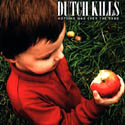 Dutch
Kills Dutch
KillsNothing Was Ever the Same EP (Wordclock) Branching out a bit from the more spare sounds of Scale 300 Feet to the Inch, Dutch Kills fills the speakers and still manages to keep a one-to-one conversation going strong. That's what I liked best about that album. Most albums are obviously aimed at this or that sort of sound. Dutch Kills simply played to whatever listener was around. This may sound like a stupid distinction, but I would disagree. These boys have the knack of creating an intimacy with just a few notes. The music immediately drew me in. And I think it does the same for a lot more people as well. I paged through some of the reviews, and no one really knows how to describe the band. That's what I'm talking about. The folks love the stuff but can't quite describe it. Not quite emo, not quite post-rock, not quite indie rock, not quite anything in particular. Just all them expressed in the most engaging way possible. Someday these boys are going to blow up something fierce.
Contact:
 Friends of Lizzy Friends of LizzyThe Answer (self-released) Subtitled EP, Summersongs & Demos, Friends of Lizzy is kind enough to provide 13 songs (and one remix) on this disc, which is more than enough to whet the appetite. There are two guys here who play piano. Often enough, neither do, but it sounds like most of the songs here were written at the keys. Piano rock does seem to be making a bit of a comeback, and most folks will tell you that even if the finished songs don't use a piano, such tunes have a slightly different kant than pieces hashed out on guitar. Take New Order, whose songs were always written on guitar even though the band could go entire albums without actually using a six-string. No matter. One can tell these things. These are grand, swooping songs. Even the kickier bits have a fine veneer of grandeur. The sound--even on some of the demos--is full and almost lush. The EP section in particular is utterly cushy. A perfect match for the romance of the songs. Really solid stuff. Even the more-ragged demos impress--in fact, a couple of those are among the best pieces on the album. Friends of Lizzy isn't afraid to take chances, and those chances pay off. I smell an up-and-comer.
Contact:
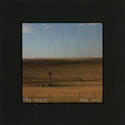 The
Graze The
GrazeIowa Anvil (J-Shirt) The first track, "Devices," is a study in how any song can be translated into just about any genre. Despite its presentation here as something of an alt. country wallow, the riffage and vocal melodies are straight out of grunge anthems. And many of the other songs here seem to have fallen through the cracks into this rootsy sound. And that's cool. The songs rarely move at faster than a mid-tempo pace, and often they drag markedly. Not exactly the sort of stuff that generally rips apart my ears. But then when something like "I Am the Little Girl" (where the Graze just says "fuckit" and launches into something akin to laptop grunge) comes along, well, I'm suddenly locked in. These songs go every which way, as does the sound of the album. Some songs are small, intimate affairs, and others fill the walls with sound. Some pieces even manage to go both ways without tearing themselves apart. That's an accomplishment in and of itself. Yeah, the Graze (which is, in fact, one guy named Louis O'Callaghan) probably ought to settle down and focus just a bit. But a one-man-band isn't going to do that. And O'Callaghan shouldn't. Ride the waves of idiosyncrasy until they break into something truly astonishing.
Contact:
������������������������������������� 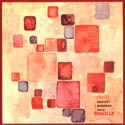 Khoury Shearer Hall Khoury Shearer HallBraille (Public Eyesore) Michael Khoury, Jason Shearer, Benjamin Hall; violin, sax, percussion. Not exactly a traditional trio, and not exactly a traditional sound. The songs sound like they've been sketched out, but not actually arranged. There is a large amount of improvisation, to be sure. Mostly, though, what makes this disc click is the ability of the three players to communicate with each other and combine to create something greater than themselves. In part because of the instruments these guys play, but mostly because of their musical ideas, the pieces here remind me a lot of "Rite of Spring" and other modern classical works. These boys aren't afraid to mix melody and dissonance in order to make a point. And it's that willingness to go out on an edge--even while keeping a hand on the wall--that serves the trio best. The sound is almost undeveloped. The drums rumble, the sax squeals and the violin wails. There isn't a lot of subtlety in the sound, though the playing itself is often achingly beautiful. Even though the trio takes on a number of jazz themes, the overarching ideal is more of a classical one. I'm not schooled enough to explain this difference properly, but it's one that I think I can hear. In the end, though, it doesn't matter precisely what the sound is as long as the music is good. And you know something? The music is great.
Contact:
������������������������������ ������������������������������������� 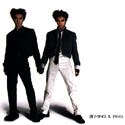 Ming and Ping
Ming and Pingmingping.com (Monotone-Omega Point) Twins from San Francisco who absolutely adore the danceable side of new wave. Dead or Alive, Erasure, New Order, early-OMD ("Tesla Girls," etc.), that sort of thing. Keyboard and sequencer-driven songs, melodies that soar with simple grace. Ah, takes me back to high school. Yeah, I've got a 20th reunion in a couple years. I'm that old. And I remember when this sort of music kinda bubbled beneath the surface pabulum of the mid-80s. Billy Ocean may have been a big star, but there was a lot of great stuff that didn't quite get the airplay. Even now, I'm still discovering some hidden treasures from that period. Ming and Ping don't appear old enough to have been listening to the radio (or buying LPs) back in 1983, but they've obviously steeped themselves in the sounds of the time. These songs are jaunty, loopy blurts of joy. I don't know how anyone could hear them and fail to smile. The 80s have come so far back that they're starting to go away again. Ming and Ping may not have much of a wave to ride with their electronic pop, but they have managed to craft a truly exciting and blissful album. And that's always a good thing.
Contact:
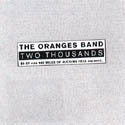 The
Oranges Band The
Oranges BandTwo Thousands (Morphius) Two five-song EPs and four other tracks. So it's not exactly an album, and it isn't necessarily supposed to mesh together nicely. Of course, considering the sort of music these boys play, not much is going to match up anyway. Among the rules in punk music (and while there are many rock elements here, these guys are punk) is that keyboards are verboten. I know, no one pays attention to this any more, but the Oranges Band plays that rough, hardscrabble, staggering style of punk that is old, old school. And yes, I know almost all the 70s punk icons used electric piano or some such. But not like this. Not as a significant melodic element. Not as a sonic touchstone. Imagine the Jesus Lizard with keyboards. Well, okay, you got me there once again...but that's the sort of freewheeling, volume-dosing music we're talking about. Somewhere between Men at Work and the Jesus Lizard, I guess. I mean that as a compliment, by the way. There's a thousand ways to take such a reference badly. But I am sincere in my admiration. The Oranges Band makes a righteous racket, and it does so in some truly unusual ways. Bite the adrenaline wire and hold on.
Contact:
������������������������������ ������������������������������������� 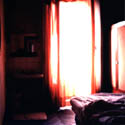 Renato Rinaldi Renato RinaldiThe Time and the Room (Public Eyesore) Okay, now this is a more traditional Public Eyesore release. Renato Rinaldi likes to make noise on his guitar, and he's recruited a couple friends to help out here and there. This is the sound of one person going mad. That's a good thing, of course. These noisy improvisations have stories to tell, and the only way to truly hear those stories is to abandon all rational thought. Sit back, close your eyes and go where the music goes. It is music--there's a surprising amount of melody, actually--and it does travel in a distinct path. This was originally recorded for radio (Italian radio, I think), and so the sound is quite good. Rinaldi may have a friend in dissonance, but the quality of the sound here really brings out the little things he throws into his pieces. Intriguing and alluring. Yeah, this isn't a disc to slough off on yer ten-year-old niece for her birthday, but it is one that just might realign your brain in a few important ways.
Contact:
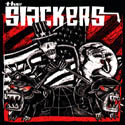 The
Slackers The
SlackersInternational War Criminal EP (Thought Squad) I've gotta hand it to the Prez--he's managed to inspire some of my favorite bands to find new reserves of creativity. The recent Bad Religion album The Empire Strikes First is that band's best album in more than 10 years, and this EP finds the Slackers in fine form as well. And while the songs are decidedly political, the tunes are just as jaunty and bright as ever. So nothing bogs down, like, say, two-thirds of Sandinista. Rather, the boys have crafted some of the catchiest protest anthems around. Big smiles, my friends. Yeah, the subject matter is heavy, but this album is a breath of fresh air. Throw it on at your next party and rock steady with a few of your most "subversive" pals. Contact:
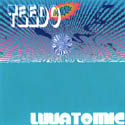 Teedo TeedoLuvatomic (self-released) If Urge Overkill had been more into Chic than, say, ZZ Top, it might have ended up sounding like this. Teedo wears funk like a cheap suit, blowing away its grooves with plenty of guitar and falsetto. There's something kinda sweet about a punky soul band that is most sincere in everything it does. Teedo Bilecky's versatile voice is able to carry the songs as they whip around the stylistic universe. Yeah, it all comes back to soul (and in particular, late 70s soul), but there's so much more going on. And yet the sound itself is anything but complicated. The funk is simple and straightforward; the guitars slink around in their shiny suits and Teedo weaves above it all. The combo is tight (there is a core trio, though guitar and drumming duties are shared by many), and the songs never lose their focus. A nice, laid-back bit of fun for the end of the summer. Teedo is probably a bit too creative for the masses--certainly, the hands-off production leaves out that oft-annoying commercial punch--but I had one hell of a good time.
Contact:
������������������������������ ������������������������������������� 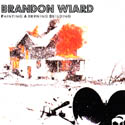 Brandon Wiard
Brandon WiardPainting a Burning Building (Cerberus) Bright, shiny pop songs (or, as his web-site so eloquently puts it, "Michigan indie-pop") that have just enough of an undertow to kill off the initial sugary overkill. Set the hook--then yank hard! In fact, Wiard seems to really dig the darker sides of the universe. The songs themselves rarely lose their smiley-face sheen, but the lyrics can get downright mean. Again, this is about the best way to use pop. Obviously a Nick Lowe devotee (and there's nothing wrong with that), Wiard isn't above slipping in a little misdirection and slop when it feel right. Kinda like those intentional flaws that make up the "signature" of a master craftsman's work. The sound has that clunky "real" feel that made Lowe famous as a producer. Truly exciting music. Wiard has a real knack for writing lyrics that cut right to the chase, and then crafting some fine pop music to dress the whole song up. Top notch all the way.
Contact:
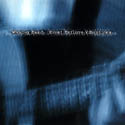 Woosley Band Woosley BandEvent Failure Vibrations (self-released) I've always had an affection for Sean Woosley's songs. He's got an off-handed way of making his points that slides right into my logic center. Often enough, he matches those unusual ideas with some solid rock and roll to make memorable songs. This album finds Woosley and the boys in a decidedly Springsteenian phase. Early Asbury Park, I'd say, somewhere between the first and second albums. Loose, lanky riffs and half-shouted choruses. Music that moves just enough to sound effortless. The sound, too, is very 1974. Almost no sharp edges whatsoever. It's like this album was recorded in seriously antiquated facilities. Could just be a truly skilled--or inept, I suppose--producer. Whatever the case, the sound fits the songs perfectly. In fact, it's that sound that really takes this album over the top. Yes, the songs are great, and the performances are wonderfully easy on the ears. Woosley Band doesn't go out on any limbs, and yet the result is a completely satisfying album. Sometimes life works out like that. Contact:
Old friends: The Dwarves The Dwaves Must Die
(Sympathy for the Record Industry)
King Missile III Royal Lunch (Important)
Macha Forget Tomorrow (Jetset)
The Muffs Really Really Happy (Five Foot Two-Oglio Records)
Q-Ball Fortune Favors the Bald (self-released)
Sahara Hotnights Kiss & Tell (RCA/BMG)
Also recommended: Blackie and the Rodeo Kings Bark
(True North)
Bronze A Common Prayer (self-released)
Colin Clary and the Magogs Her Life of Crime (North of
January)
Coastal Halfway to You (Words on Music)
The Datsuns Outta Sight/Outta Mind (Hellsquad/V2)
Gerritt "...Sails the Seas of Displacement" 12" (Dielectric)
Hellboys Cha Cha with the Hellboys (self-released)
June Star Sugarbird (Toadfish)
Kultur Shock Kultura-Diktatura (Kool Arrow)
Leaving Rouge White Houses EP (Greyday Productions-Down Peninsula
Audio)
Mixtwitch All Bets Are Off EP (self-released)
Mono Walking cloud and deep red sky. Flag fluttered and the sun
shined (Temporary Residence)
Only Crime To the Nines (Fat Wreck Chords)
The Paybacks Harder and Harder (Get Hip)
7th Dimennsion Sex, Light and Rock 'n Roll (self-released)
Tom Thumb Songs from Holiday (self-released) ������������������������������������� | |
return to A&A home page